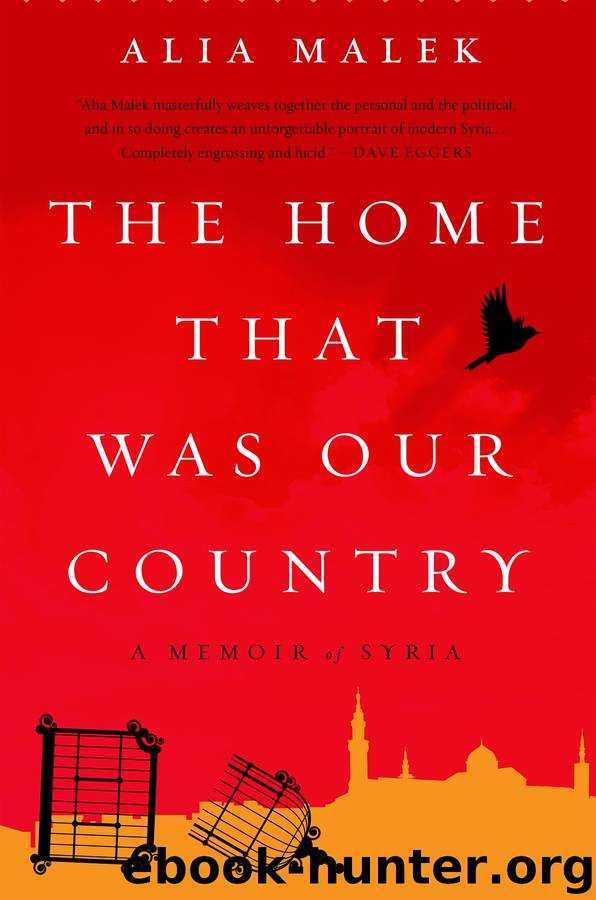The Home That Was Our Country by Alia Malek

Author:Alia Malek
Language: eng
Format: epub
Publisher: PublicAffairs
Published: 2017-02-28T05:00:00+00:00
A YEAR INTO my life in Beirut, my parents decided they wanted to celebrate their thirtieth wedding anniversary in Syria with their children. They wanted to throw a party in Damascus, where they hadn’t been together since their wedding day. We had also never all been in Syria at the same time.
My mother, Zayn, and Farah had been to Damascus six years earlier, when I hadn’t been able to meet them, but my father had not visited for eighteen years—ever since his father, the carpenter widower, had died. My sister Manal—who had not been since 1990—flew in from the US city where she was a medical resident. My brother, Zayn, an economist, came in separately, and my other sister, Farah, who was about to start a new job as an engineer, flew in with my parents. As it happened, of all my immediate family, I was the one who had returned most frequently by then to Syria.
Instead of staying with relatives, we stayed in the Cham Palace Hotel at the center of the city. This was uncharacteristic of my father, who, despite being successful in the United States, was disdainful of certain kinds of expenditures, fancy hotels and vacations—basically fun—among them.
My siblings and I were introduced to an even wider circle of family and friends, who had never seen all of us together. We were sized up, of course. As far as anyone knew, we were all—in order of importance—single, had American passports, and were fairly attractive and well-educated. My sisters, a doctor and an engineer, were considered smarter than my brother and I, who had studied law and economics (Zayn at an Ivy League university, for what it’s worth).
After all, in Syria, how a student performs at the age of eighteen on standardized nationwide exams determines what (not where) he or she will study. The university system is public, and as such—because the state is providing the education—the student studies what it tells him or her to study. (Private universities had only just begun and were untested.) The smartest were herded toward medicine, pharmacy, and engineering. Lower scores got a person into the faculties of law and business (which is how my brother’s degree was understood by many). I always figured the reason was that such professions, what with their notions of justice and market economics, were more threatening to the power structure than the legions of really good Syrian doctors out there, many of whom went on to serve populations abroad, as my own father did.
I was happy to have my entire family there. I had always visited Syria on my own as an adult, and I was regarded by many of my distant relatives as much too unconventional. People had been suspicious of my having lived in so many places, all of which were not my parents’ house. Unmarried women living on their own were suspected of sexual promiscuity. For the smaller minded (and there were many of them, I’m embarrassed to say), the fact that I lived in Beirut only confirmed the suspicions.
Download
This site does not store any files on its server. We only index and link to content provided by other sites. Please contact the content providers to delete copyright contents if any and email us, we'll remove relevant links or contents immediately.
| Africa | Americas |
| Arctic & Antarctica | Asia |
| Australia & Oceania | Europe |
| Middle East | Russia |
| United States | World |
| Ancient Civilizations | Military |
| Historical Study & Educational Resources |
Empire of the Sikhs by Patwant Singh(23070)
The Wind in My Hair by Masih Alinejad(5089)
Rise and Kill First by Ronen Bergman(4778)
The Templars by Dan Jones(4681)
The Rape of Nanking by Iris Chang(4201)
12 Strong by Doug Stanton(3541)
Blood and Sand by Alex Von Tunzelmann(3193)
Babylon's Ark by Lawrence Anthony(2671)
The History of Jihad: From Muhammad to ISIS by Spencer Robert(2618)
No Room for Small Dreams by Shimon Peres(2362)
The Turkish Psychedelic Explosion by Daniel Spicer(2353)
Inside the Middle East by Avi Melamed(2349)
Gideon's Spies: The Secret History of the Mossad by Gordon Thomas(2337)
Arabs by Eugene Rogan(2292)
The First Muslim The Story of Muhammad by Lesley Hazleton(2263)
Come, Tell Me How You Live by Mallowan Agatha Christie(2249)
Bus on Jaffa Road by Mike Kelly(2150)
1453 by Roger Crowley(2022)
Kabul 1841-42: Battle Story by Edmund Yorke(2020)
